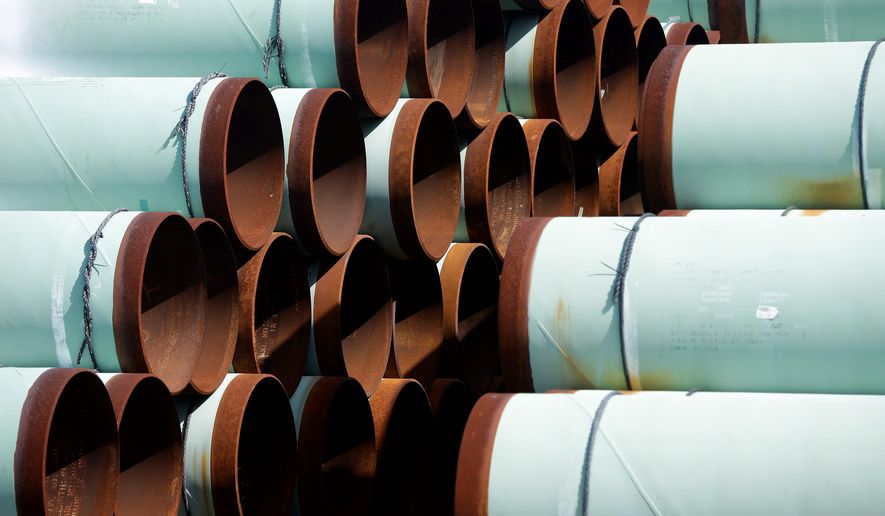After dragging on for six years, the political football game that is the Keystone XL pipeline debate finally is entering the fourth quarter.
A confluence of events — a looming court decision in Nebraska and the GOP capturing full control of Congress in the midterm elections last week — will force President Obama’s hand on the massive Canada-to-Texas project, analysts say, and the pressure on this White House to say “yes” or “no” will grow significantly in the coming months.
But the president also is being pushed from the left, with environmental groups urging the administration to rely on executive actions to advance climate change objectives, including the definitive rejection of Keystone.
For now, Mr. Obama still is straddling the fence.
At a post-election press conference last week, Mr. Obama said he was waiting for the result of a high-stakes court case in Nebraska, where the state Supreme Court must decide whether the pipeline’s proposed route is legal. A ruling is expected sometime in the next several months, and some specialists say they believe the court will uphold the planned path.
“On Keystone, there’s an independent process. It’s moving forward, and I’m going to let that process play out,” Mr. Obama said. “There’s a pending case before a Nebraska judge about some of the siting. The process is moving forward, and I’m just going to gather up the facts.”
SEE ALSO: Drill, baby, drill: Midterm victories signal renewed hope for the Keystone XL Pipeline
The president also once again laid out his litmus test for Keystone — will it be good for the American economy and will it measurably increase greenhouse gas emissions?
Those questions, pipeline supporters argue, already have been answered. A State Department report concluded Keystone won’t have a significant impact on the climate. It also found the project will create more than 40,000 jobs.
When they take full control on Capitol Hill in January, one of Republicans’ first orders of business surely will be to pass legislation deeming the pipeline approved. Such a measure already has passed the House and likely would have passed the Senate last year but was held up by outgoing Senate Majority Leader Harry Reid.
Incoming Senate Majority Leader Mitch McConnell, Kentucky Republican, said that addressing Keystone in the context of a larger focus on energy will be one of his top priorities next year.
“We haven’t had an energy bill in seven years,” Mr. McConnell said last week. “When you say ’energy’ these days, people think of the Keystone pipeline, but that’s only part of it. We need to embrace the energy revolution that’s going on in our country.”
Analysts predict that, in the end, Mr. Obama will defy his supporters in the environmental community and approve the project. The only question, they say, is how Republicans handle the issue politically.
SEE ALSO: Obama vows to use executive action on immigration before new GOP Congress is sworn in
“It will be passed by the Congress and, ultimately, I suspect the president is going to go along with it,” said Brigham McCown, former head of the Transportation Department’s Pipeline and Hazardous Materials Safety Administration. “The president has kicked the can down the road for six years. He’s made it clear he doesn’t want to have to make a decision, and having a split Congress, he hasn’t needed to.”
Mr. McCown said were it his decision, he would attach Keystone’s approval to another piece of legislation, to make the approval slightly more palatable for Mr. Obama. “You don’t shove the president’s nose in it,” he said. “You just put it in there and you let it go.”
While the likelihood of Keystone being approved seems as high as it has ever been, Mr. Obama’s final decision could carry serious political fallout.
Environmentalists have made the pipeline a symbol of the larger fight against climate change, and some groups have gone so far as to claim that Mr. Obama’s legacy on the issue of global warming is entirely tied to what he does on Keystone.
They now want him to aggressively use executive authority to advance environmental priorities, not promote what they say is a particularly dirty source of fossil fuel from the tar sand deposits of Canada.
The environmental group Friends of the Earth, for example, is calling on the president to use his pen to kill Keystone once for and all through unilateral executive action.
“President Obama has a responsibility to unify the Democratic minority in the House and Senate to oppose, and veto if necessary, legislative efforts that undermine Americans’ access to a just and healthy environment,” said Erich Pica, the organization’s president. “The election results change nothing, since Americans still care about smart climate policies and expect President Obama to champion them — and that means rejecting the Keystone XL pipeline” and pursuing other environmental aims.
• Ben Wolfgang can be reached at bwolfgang@washingtontimes.com.




Please read our comment policy before commenting.